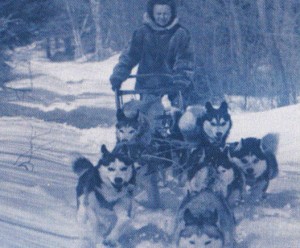The Siberian – A Brief History
114 – June, 2016
By Amy Fernandez
 Public curiosity surrounding Admiral Byrd’s Antarctic voyages back in the 1930s was comparable to the attention focused on America’s space program 30 years later. Byrd, a national hero, set off to conquer a foreboding frontier that had defied centuries of human effort. Most interest centered on the cutting-edge science and technology making that possible. However, one big chunk of equipment was pretty ancient, 157 sled dogs. And fascination about that probably exceeded all the rest.
Public curiosity surrounding Admiral Byrd’s Antarctic voyages back in the 1930s was comparable to the attention focused on America’s space program 30 years later. Byrd, a national hero, set off to conquer a foreboding frontier that had defied centuries of human effort. Most interest centered on the cutting-edge science and technology making that possible. However, one big chunk of equipment was pretty ancient, 157 sled dogs. And fascination about that probably exceeded all the rest.
Sled dogs entered popular culture in Victorian times when explorers learned their value the hard way. Writers like Jack London galvanized that thrilling image of huge, powerful, brute force dogs hauling freight through the frozen wilderness. That was definitely Byrd’s impression when he laid eyes on those little Siberian Huskies that his dog handler, Richard Moulton, had packed for the trip. Moulton knew better than to underestimate them. He had seen them in action. Byrd’s expedition would put them through another grueling test, but not quite the way everyone envisioned.
From the moment they lifted anchor in Boston Harbor on October 11, 1933, everything that could go wrong did go wrong. They only made it to Bayonne, New Jersey for refueling when an oil line sprung a leak drenching half the dogs. At the next stop in Norfolk, Virginia, they loaded 3500 tons of coal, accidentally dumping a thick layer of coal dust on them for good measure. They continued on to Panama, which triggered the collective realization that this polar venture had no hot weather protocols. Most of the dogs went down with heatstroke. Then there were the mismatings, fights, and dog overboard incidents while trying to exercise the dogs on deck. Among other things, Byrd’s crew discovered that whether on land or water, Siberians just keep going. Dog management remained a work in progress, but once they got there and hitched those teams up, 3000 years of preprogrammed instinct kicked in. Those little Siberians
were all business.
114 – June, 2016
Short URL: https://caninechronicle.com/?p=105629
Comments are closed











